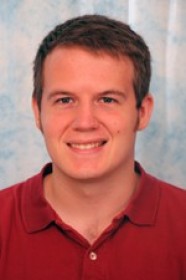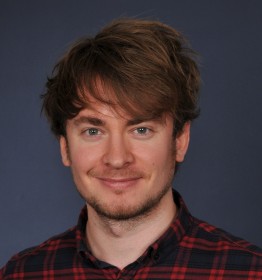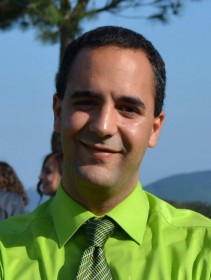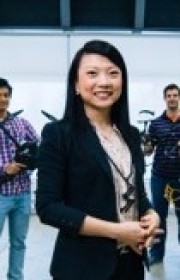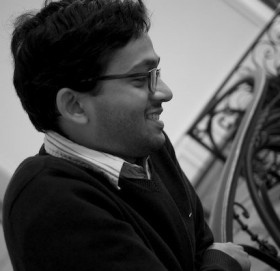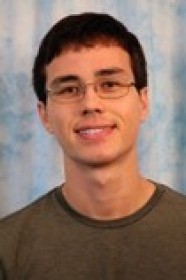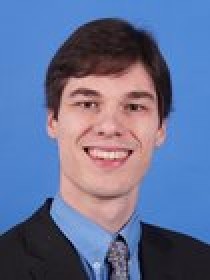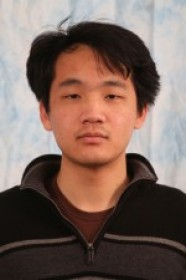Tracking and Calibrating Articulated Robots using SLAM Techniques
Event Location: NSH 1305Abstract: Robots still struggle with everyday manipulation tasks. An overriding problem with robotic manipulation is uncertainty in the robot's state and calibration parameters. Small amounts of uncertainty can lead to complete task failure. This thesis explores ways of tracking and calibrating noisy robot arms using computer vision, with an aim toward making [...]
Rovers for Exploring Lunar Pits and Caves
Event Location: GHC 2109Bio: John Walker completed his aerospace PhD at Tohoku University in 2016. His Mechanical Engineering degree was earned at the University of Alberta in 2005. In 2010 he attended the International Space University in Strasbourg, France. This was followed by an internship at the Space Robotics Lab at Tohoku University in Japan [...]
Factoring Scenes into 3D Structure and Style
Event Location: GHC 4405Abstract: Given a single image of a scene, humans have few issues answering questions about its 3D structure like “is this facing upwards?” even though mathematically speaking this should be impossible. We have similarly have few issues accounting for this 3D structure in answering viewpoint independent questions like ``is this the same [...]
Deep Learning for Robot Manipulation via Simulation
Event Location: Newell Simon Hall 1507Bio: Ed Johns is a Dyson Fellow at Imperial College London, working on computer vision, robotics and machine learning. He received a BA and MEng from Cambridge University, followed by a PhD in visual recognition and localisation from Imperial College London. After post-doctoral work at University College London, he then [...]
Matrix Completion: A vision-oriented perspective
Event Location: Newell Simon Hall 1507Bio: Xavier Alameda-Pineda received the M.Sc. degree in mathematics and telecommunications engineering from the Universitat Politècnica de Catalunya – BarcelonaTech in 2008 and 2009 respectively, the M.Sc. degree in computer science from the Université Joseph Fourier and Grenoble INP in 2010, and the Ph.D. degree in mathematics/computer science from the [...]
Navigating Unmanned Aerials Vehicles at Low Altitude: Accuracy, Reliability and Security
Event Location: NSH 1507Bio: Grace Xingxin Gao is an assistant professor in the Aerospace Engineering Department at University of Illinois at Urbana-Champaign. She obtained her Ph.D. degree in Electrical Engineering from the GPS Laboratory at Stanford University in 2008. Before joining Illinois at Urbana-Champaign as an assistant professor in 2012, Prof. Gao was a research [...]
What can we do with motion cues?
Event Location: Newell Simon Hall 1507Bio: Karteek Alahari is an Inria permanent researcher (chargé de recherche) since October 2015. He has been at Inria since 2010, initially as a postdoctoral fellow in the WILLOW team in Paris, and then on a starting research position in Grenoble since September 2013. Dr. Alahari's PhD from Oxford Brookes [...]
Rover Localization in Sparsely-Featured Environments
Event Location: NSH 1507Bio: Samuel Yim is an M.S. student in the Robotics Institute advised by David Wettergreen. He received a B.S. in Engineering from Harvey Mudd College in 2014. His current research focuses on robustly detecting and describing features for SLAM applications.Abstract: Autonomous outdoor localization is a challenging but important task for rovers. This [...]
Convex Interpolation Control with Formal Guarantees for Disturbed and Constrained Nonlinear Systems
Event Location: GHC 2109Bio: Bastian Schürmann is a PhD candidate at the Institute of Robotics and Embedded Systems at the Technical University of Munich, Germany. There he works in the Cyber-Physical Systems group with Professor Matthias Althoff. His research focuses on obtaining controllers with high performance and formal guarantees for safety-critical systems. This is achieved [...]
In-Field Parameter Selection for Perception Context Adaptation
Event Location: NSH 1305Abstract: Perception and state estimation are critical robot competencies that remain difficult to harden and generalize. This is due in part to the incredible complexity of modern perception systems which are commonly comprised of dozens of components with hundreds of parameters overall. Selecting a configuration of parameters relies on a human's understanding [...]


